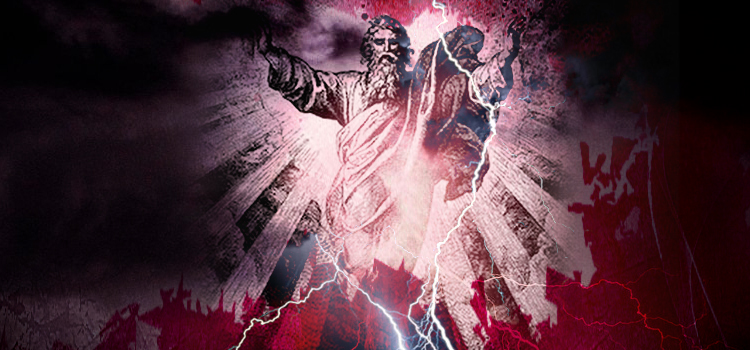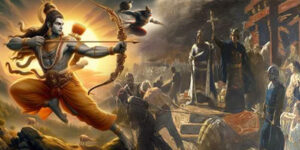Monotheism – particularly as viewed from the perspective of those who follow pluralistic traditions – often appears as a kind of arrogance, not as a type of true spirituality.
That there is only One True God, and all other Gods, are false, sounds like a statement of arrogant intolerance, not an experience of higher consciousness.
Monotheistic groups seem to claim ownership over God, as if the Divine were a kind of property, proclaiming to the world that only their God is the true God – and all other Gods should not be tolerated and probably eliminated.
Such harsh and rude lines of thinking seem out of place in the spiritual, mystical and yogic realms, which should make us more sensitive to other people and to nature as a whole.
Monotheism often resembles egoism, such as is common in human behavior on both individual and collective levels. “Monotheistic arrogance,” like other forms of personal or cultural arrogance, leads to aggression and the attempt to dominate and control, if not suppress and destroy the other.
Monotheists often create agendas to convert or conquer the entire world to a single belief, which becomes their main activity and effort in life that they promote with a religious zeal that can become fanatic and blind.
While such conversion agendas may be less overt in the post-colonial era, since their supporting armies were withdrawn, they are still a major focus for many monotheistic groups worldwide and the subject of vast planning, funding and subterfuge.
The One God of monotheism may be defined as infinite and eternal but he seems to act in a way that is partial and limited, favoring his chosen people, community or believers over all others, though these are also human beings.
The One God of monotheism may be regarded as formless or as an impersonal truth, but his actions appear mixed with ordinary emotions like anger and envy. His fiats, condemnations, heaven and hell seem more like human excesses than Divine virtues.
It is clear, if we look deeply, that monotheistic formulations of Divinity are often colored by the ego of the people and groups who have made them. Whatever Divine energies that may come in with such monotheistic inspirations seem to easily get clouded by the rigidity, if not arrogance of their monolithic approach.
Monotheism seeks to impose an artificial uniformity on the richness of the human religious and spiritual experience that has had many forms and expressions in cultures and individuals throughout the world and throughout history.
What we need today is a renaissance of spirituality, mysticism, Yoga and meditation beyond such boundaries of belief, institution and personality. In that broader context exclusive monotheistic approaches cannot likely have a dominant role.
Unless we understand and remove this arrogance in monotheism, it will probably continue to give rise to intolerance, crusades, holy wars, missionary agendas, and the denigration of other spiritual paths. It will likely continue in its destruction of cultures and peoples that has already been going on over the last two thousand years and has already devastated several continents of the world.
We need not deny the spiritual, mystical or artistic inspiration that anyone may find anywhere, and each person or group should be free to develop that. But in a pluralistic society we cannot blindly accept exclusivism and the denial of pluralism in the name of religion as representing some Divine truth or virtue.
Hindu Dharma
Hindu Dharma honors the universal and has a pluralistic orientation at a spiritual level, accepting the existence of many paths and gurus, and different teachings for different temperaments. As such, Hindu Dharma cannot accept or honor exclusivist and intolerant monotheistic teachings as truth, or regard them as valid spiritual paths not to be questioned.
Hindu Dharma teaches us that arrogance is born of ignorance. We are all members of the same universal family, and are ultimately all formations or manifestations of the same Divine Self and supreme consciousness. Hindus accept the unity of all existence, the unity of life, consciousness and truth. But we hold that the One is also infinite, and its expressions are many, constituting the entire universe – from which no creature or soul can be left out.
We must move from the stage of monotheism – that there is only One True God and all other Gods are false – to the stage of monism and unity awareness, in which we recognize that everything is Divine and One Consciousness is the root of all. We may need to discover that monotheism represents a lower level of spiritual experience and knowledge, in which the human ego and its arrogance still colors our contact with the Divine with our own biases.
Hinduism does not have an exclusive but rather an inclusive view. It states that to the Divine, however you wish to formulate it, belongs all names and forms, the entire universe, all of time and space and beyond.
There is no need to save or conquer anyone in the name of God. What is required is that we honor the sacred nature of all beings, and recognize that the same Self and consciousness resides in the hearts of all – though in our ignorance and arrogance we may fail to recognize it! We should strive to live in that unity consciousness, not in a rigid belief.
Unfortunately, some Hindu groups – perhaps seeking favor from monotheistic groups that are still very strong today – may try to claim that Hinduism is also monotheistic religion because it holds to a unity of truth.
This is a mistake that only serves to undermine the value of Hinduism, which tells us to protect all spiritual paths, and not to bow down to any form of exclusivism even at a spiritual level. Trying to make Hinduism a kind of monotheism can betray the universal principles of Hinduism.
It can also help undermine the many other pluralistic groups in the world, like the pagans of Europe or the Native Americans, who are still struggling against the monotheistic onslaught and follow dharmas closer to our own.






























